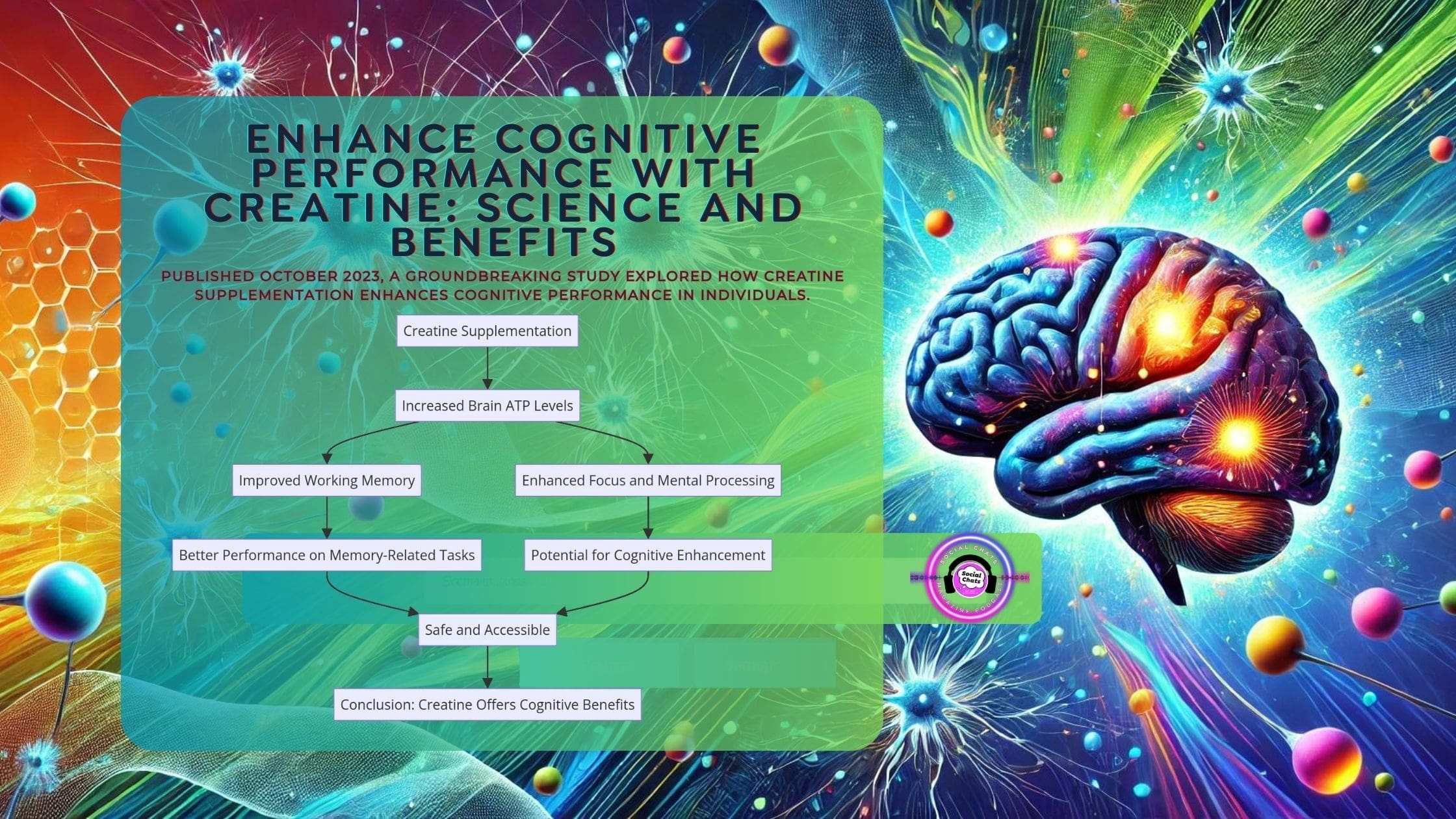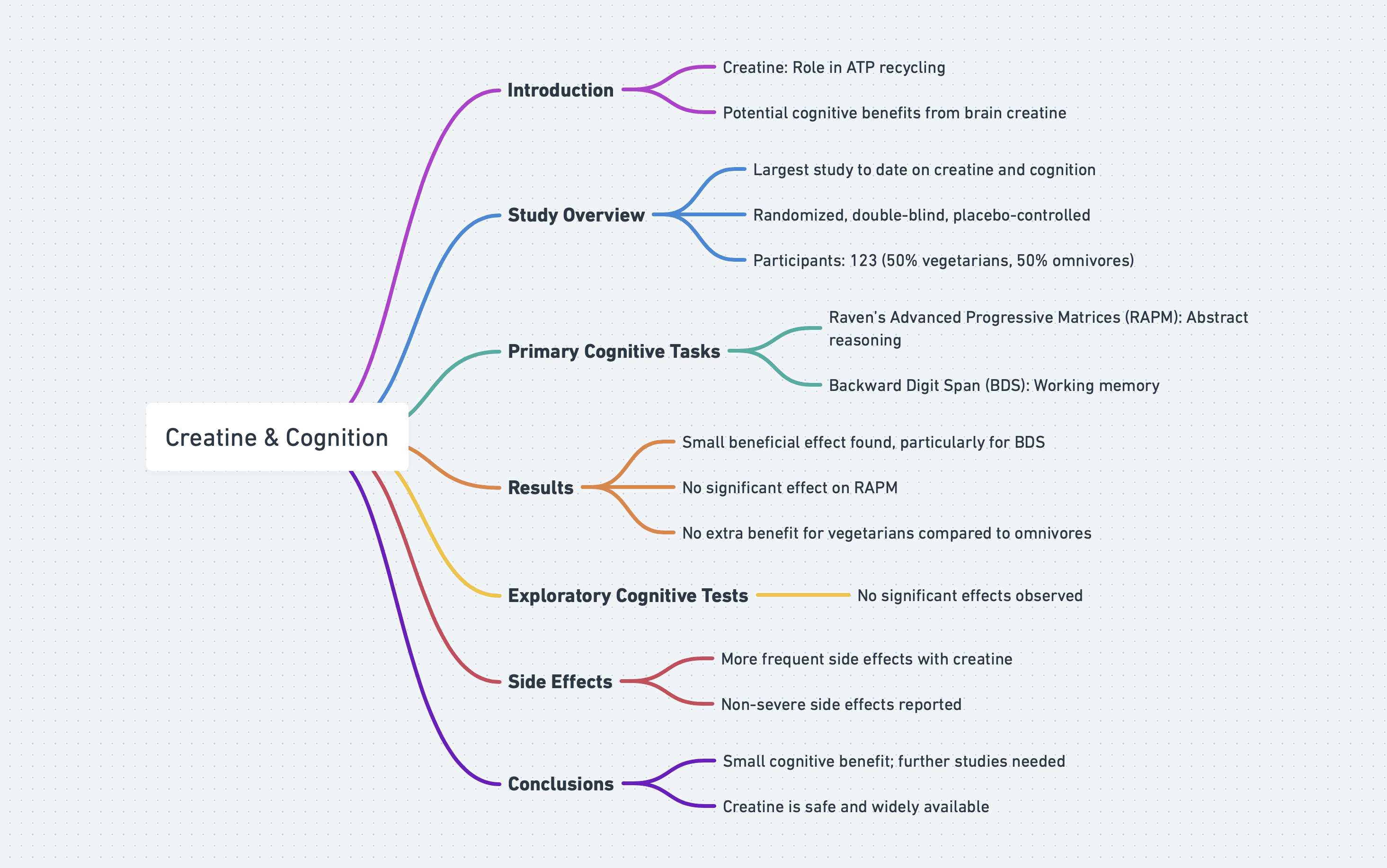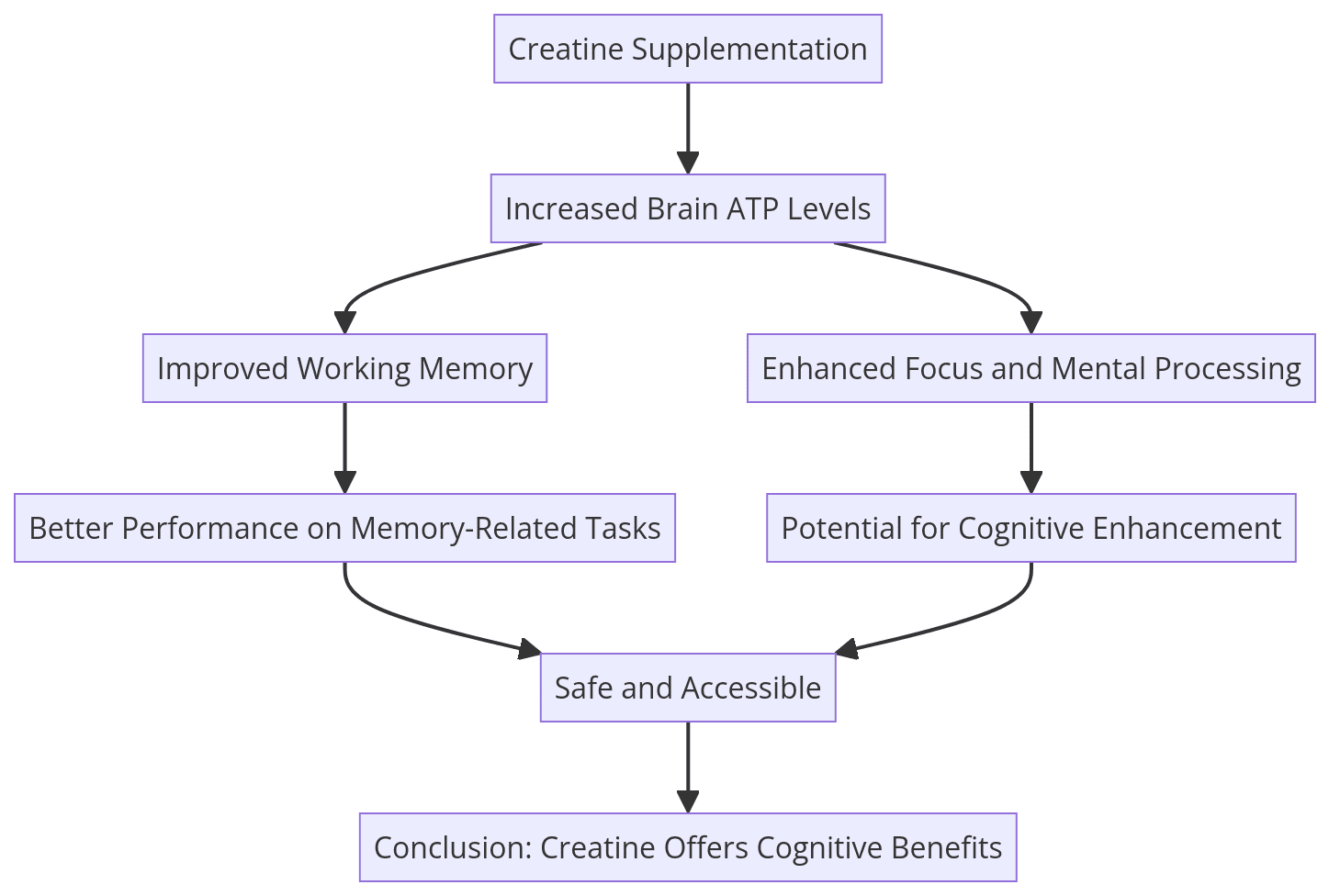

In October 2023, a groundbreaking study explored how creatine supplementation enhances cognitive performance in individuals. While creatine is well-known for improving physical strength, its cognitive benefits are gaining increasing recognition. This study, the largest of its kind, tested how daily doses of creatine affected tasks like memory improvement and reasoning.
Many wonder, “Does creatine help with brain function?” The research sheds light on how this widely available supplement can support cognitive performance through its role in ATP production—essential for brain energy. As a result, creatine might help boost memory, sharpen focus, and improve overall mental processing. With more people exploring ways to optimize both body and brain health, creatine emerges as a promising, safe, and accessible solution for cognitive enhancement.

Here’s a quick breakdown of the study’s findings:
- 🧠 Cognitive enhancement potential: Creatine, known for boosting strength in athletes, may have a small beneficial impact on cognitive functions.
- 🧪 Study details: Conducted with 123 participants, both omnivores and vegetarians. Each took 5g of creatinedaily for six weeks in a randomized, placebo-controlled trial.
- 📈 Memory and reasoning tests: Performance was measured using Raven’s Advanced Progressive Matrices (RAPM) and the Backward Digit Span (BDS). While creatine slightly improved memory, results for reasoning were not as significant.
- ⚖️ Effect sizes: Although Bayesian analysis showed some benefit, the effects were borderline for BDS and nonsignificant for RAPM.
- 🍃 Diet and creatine: Vegetarians were expected to benefit more, but there was no clear difference between vegetarians and omnivores.
- ⚠️ Side effects: Creatine led to more frequent side effects (4 times more than the placebo group), including digestion issues and weight gain.
- 🚨 Study significance: While creatine may have small cognitive benefits, larger trials are needed to confirm these findings.
What Is Creatine and How Does It Impact Cognitive Function?
Creatine is an organic compound primarily known for its role in boosting physical performance during high-intensity activities. Found in foods like meat and fish, creatine helps muscles produce more energy. However, what many don’t know is that creatine supplementation for cognitive benefits is also being studied. The brain uses energy in the form of adenosine triphosphate (ATP), and creatine helps regenerate this energy source when demand is high.
In this recent study, published in 2023, over 120 participants were tested on cognitive tasks such as Raven’s Advanced Progressive Matrices (RAPM) and the Backward Digit Span test. These tests measure reasoning and working memory, respectively. The results suggested a small but noticeable boost in working memory, making creatine a viable option for those seeking to improve their cognitive function over time.
Creatine’s Potential for Memory Improvement
Research consistently highlights creatine’s role in enhancing working memory. In this study, participants who took 5g of creatine daily for six weeks performed slightly better in tasks requiring short-term memory retention. While the improvements were modest, they indicate that creatine could support cognitive processes such as focus, recall, and information retention—key components of productivity and learning.
For those wondering, “How long does creatine take to improve brain function?” the study suggests that even short-term supplementation (six weeks) could lead to noticeable differences in performance on memory-related tasks.
Does Diet Matter?
One of the key findings was that vegetarians and omnivores experienced similar cognitive benefits from creatine, even though vegetarians generally have lower baseline creatine levels due to their diet. This highlights creatine’s effectiveness regardless of diet, further solidifying its role as a safe and effective supplement for cognitive enhancement.
What About Side Effects?
As with any supplement, there were some reported side effects. The most common issues included digestive discomfort and mild weight gain. However, these side effects were manageable and occurred more frequently in those who did not properly dissolve the creatine powder. Still, with proper usage, creatine remains a safe option for most individuals looking to improve cognitive function.
🧩 Conclusion Diagram:

💡 Insights Based on Numbers
- Bayesian evidence: A small effect (η² = 0.029) for BDS, indicating creatine’s slight impact on working memory.
- Side effects: Participants on creatine reported 4.25 times more side effects compared to those on placebo.
🤔 Explanatory Q&A Section Conclusion
1. How does creatine supplementation impact reasoning and working memory in different populations?
The study indicates that creatine supplementation has a small impact on working memory (measured through the Backward Digit Span test) but not on abstract reasoning (measured through Raven’s Advanced Progressive Matrices). The small effect size for working memory suggests that creatine might help individuals improve short-term memory tasks but does not strongly enhance reasoning skills. The lack of a clear difference between vegetarians and omnivores also indicates that the cognitive benefit might not depend significantly on dietary habits.Given these results, the study suggests that creatine’s cognitive effects might be subtle and depend on the specific type of cognitive task being tested, with more cognitively demanding tasks (like working memory) potentially showing greater benefits.
2. What are the potential long-term cognitive benefits of creatine?
While the study primarily focused on short-term cognitive effects, the potential long-term cognitive benefits of creatine supplementation remain speculative. Creatine could offer cumulative benefits for working memory over time, as even small improvements in tasks like the Backward Digit Span test might scale if applied over extended periods. Additionally, since creatine improves the brain’s energy capacity by aiding ATP production, long-term supplementation might gradually enhance cognitive endurance and efficiency, particularly in tasks requiring sustained attention and memory retention.However, the study emphasizes the need for larger and longer-term trials to confirm whether these modest short-term benefits translate into significant long-term cognitive improvements. Given creatine’s safety and broad availability, further research is encouraged to explore its potential role in maintaining and enhancing cognitive function as people age.
3. Why do some participants experience more side effects with creatine compared to others?
The study found that some participants experienced more side effects with creatine than others, with side effects being 4.25 times more common compared to the placebo group. These side effects included digestive issues, weight gain, and other minor symptoms such as tiredness, thirst, and cramps. The variability in side effects may be influenced by several factors:
- Individual tolerance: Some people may metabolize creatine differently, leading to varying reactions in the digestive system and water retention.
- Solubility and absorption: The creatine powder used in the study had a different solubility compared to the placebo, which might have impacted digestion. Participants who did not mix the creatine properly could have experienced more side effects.
- Pre-existing health conditions: Differences in baseline health, hydration levels, or kidney function may also affect how individuals respond to creatine supplementation.
Overall, individual physiological differences and how creatine is consumed seem to play a significant role in side effects.
🚀Conclusion:
In the words of the study’s authors, “Given the safety and broad availability of creatine, this is well worth investigating.” The study’s findings suggest that creatine offers a safe, accessible way to enhance cognitive performance, especially for tasks involving working memory. Whether you’re a student, a professional, or someone interested in optimizing your brain health, creatine might be a simple yet effective solution.
Ready to boost your brainpower? Explore creatine supplements today and take the first step toward enhancing your memory, focus, and cognitive performance!
🎯 Interactive Quiz
Here’s a quick quiz to test your knowledge:
*Disclaimer: This summary/ long form blog was created with the assistance of AI language model ChatGPT by OpenAI.
WRITTEN BY
Social Chats
Social Chats is a multimedia and entertainment company. It’s a division of kNOw Aging, inc. a communications consultancy.









